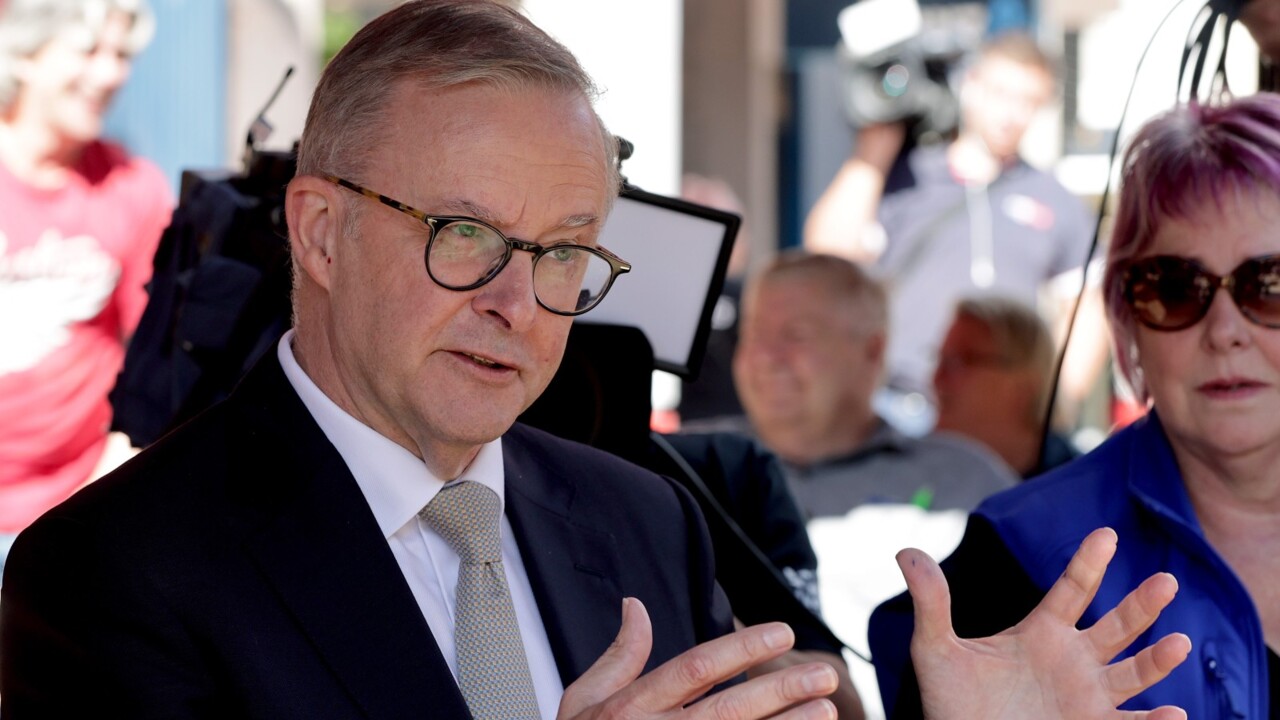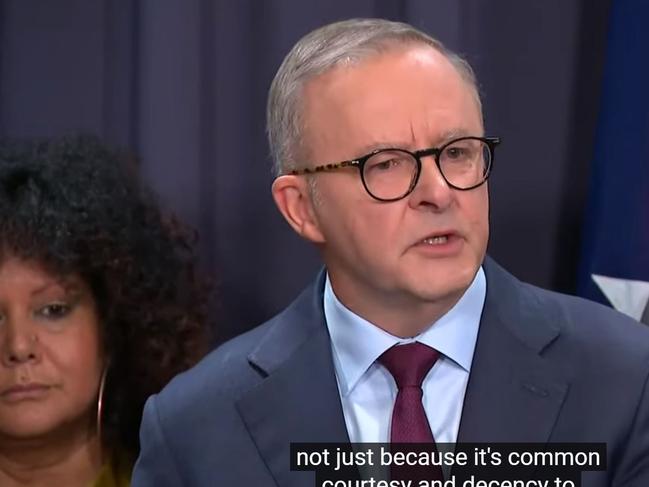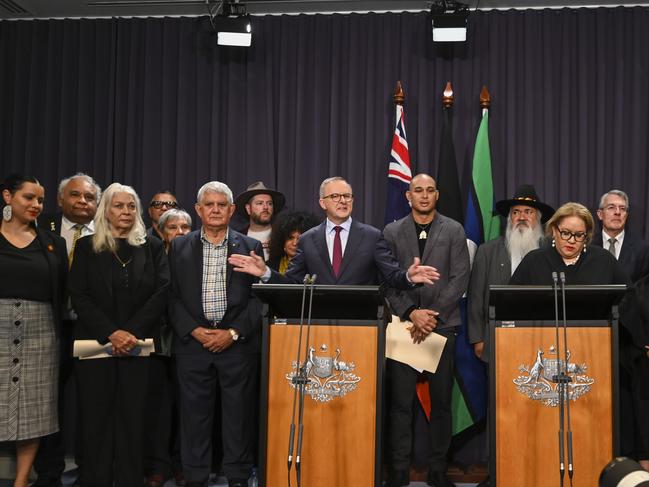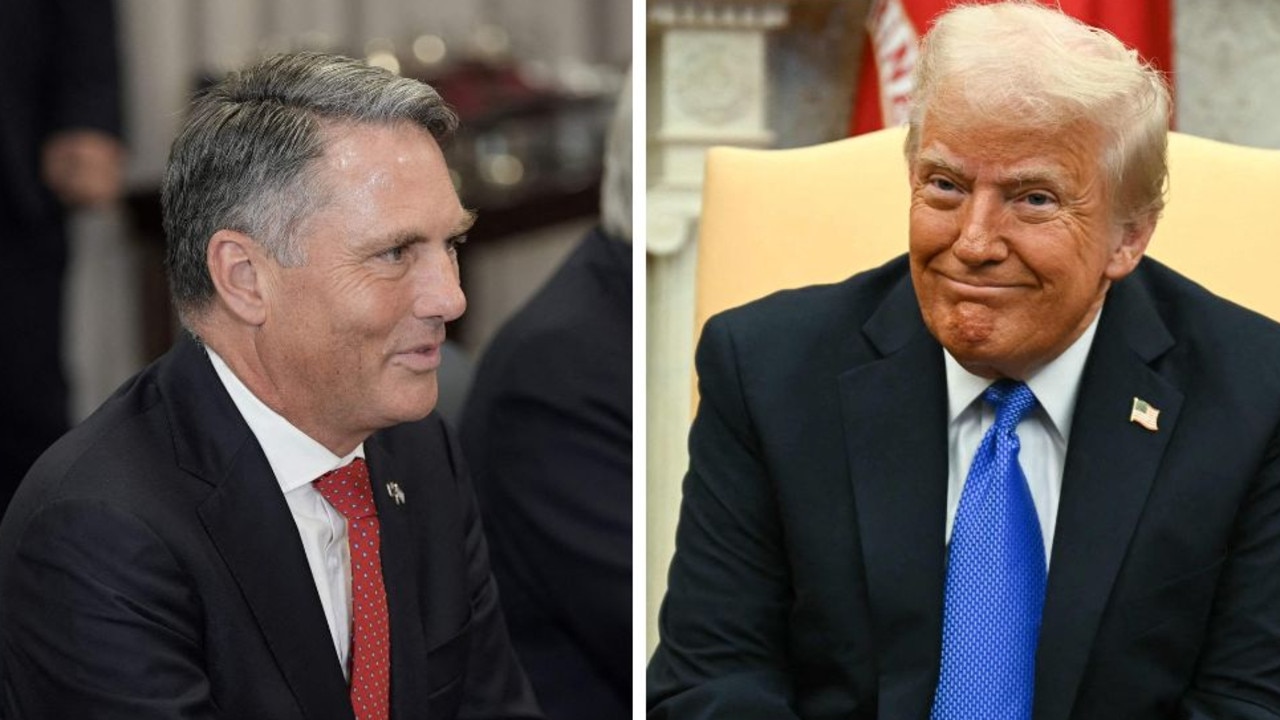How Indigenous voice to parliament will work
The exact wording of the Voice referendum has been announced as PM Anthony Albanese confirms what the next steps are before Aussies get to vote.

National
Don't miss out on the headlines from National. Followed categories will be added to My News.
Australians now know what they will be asked at the referendum for an Indigenous Voice to Parliament and how the Constitution would be changed to enshrine the advisory body.
The Prime Minister has urged Australians not to “miss” the opportunity to learn about the Voice and have their say in the referendum.
“That is an opportunity that doesn’t belong to the politicians, it belongs to every Australian equally, one person, one vote,” he said.
“People from all faiths, backgrounds and traditions.
“All of us will have an equal say, all of us can own an equal share of what I believe will be an inspiring and unifying Australian moment.”
Here is what was announced on Thursday – and what the next steps are.
WHAT IS THE REFERENDUM QUESTION?
Australians will be asked: “A Proposed Law: to alter the constitution to recognise the First Peoples of Australia by establishing an Aboriginal and Torres Strait Islander Voice. Do you approve this proposed alteration?”
WHAT HAPPENS IF THE REFERENDUM IS APPROVED?
If a majority of Australians vote in favour of the Voice, the Constitution would be amended as follows:
1. There shall be a body, to be called the Aboriginal and Torres Strait Islander Voice;
2. The Aboriginal and Torres Strait Islander Voice may make representations to the Parliament and the Executive Government of the Commonwealth on matters relating to Aboriginal and Torres Strait Islander peoples;
3. The Parliament shall, subject to this Constitution, have power to make laws with respect to matters relating to the Aboriginal and Torres Strait Islander Voice, including its composition, functions powers and procedures.
The final wording now need to be approved by the parliament.
WHEN WILL THE REFERENDUM BE HELD?
Australians are expected to vote between October and December.
WHAT IS A VOICE TO PARLIAMENT?
The Voice to Parliament would be a group of Indigenous Australians selected to consult and give advice to parliament and the government on the issues impacting their community.
proposal is an initiative to give Indigenous Australians a greater say in the decisions that affect them.
It calls for the creation of a “First Nations Voice” that would provide advice to Parliament on issues impacting Indigenous communities.
The Voice would be enshrined in the constitution, and Indigenous Australians would be consulted on legislation and policies that affect them.
The proposal was recommended by the 2017 Uluru Statement from the Heart, which was the result of a national Indigenous consultation process.
WHAT IS THE INTENTION OF THE VOICE?
Prime Minister Anthony Albanese said the constitutional provisions would enshrine the two “fundamental principles” of recognition and consultation.
“First; recognition. As Australians, we have an extraordinary privilege we share this great island continent with the world’s oldest continuous culture and the nation should recognise this and be proud of it,” he said.
“People who have loved and cared for this country for 65,000 years and more, in countless ways, we embrace it as a source of great pride. And we should recognise it.”
Mr Albanese said the principle of consultation was “not a radical notion”.
“(It’s) a sensible and practical proposition that Aboriginal and Torres Strait Islander people should have a say in the decisions and policies that affect them,” he said.

HOW WILL IT WORK?
The federal government has released nine design principles that will
A. The Voice will give independent advice to the Parliament and Government
– The Voice would make representations to the Parliament and the Executive Government on matters relating to Aboriginal and Torres Strait Islander peoples.
– The Voice would be able to respond to requests for advice, or give advice proactively
– It would have its own resources to research and develop recommendations
B. Will be chosen by Aboriginal and Torres Strait Islander people based on the wishes of local communities
– Members of the Voice would be selected by Aboriginal and Torres Strait Islander communities, not appointed by the government
– Members would serve for a fixed period of time to ensure accountability
C. Will be representative of Aboriginal and Torres Strait Islander communities, gender balanced and include youth
– Members of the Voice must be Aboriginal and/or Torres Strait Islander, as determined by the standard three part test
– Members will be chosen from each of the states, territories and the Torres Strait Islands
– The Voice will have specific remote representatives as well as representation for the mainland Torres Strait Islander population
– The Voice will have a balanced gender representation at the national level

D. Will be empowering, community-led, inclusive, respectful and culturally informed
– Members of the Voice will be expected to connect with — and reflect the wishes of — their communities
– The Voice will consult with grassroots communities to ensure it accurately represents their views and experiences
E. Will be accountable and transparent
– The Voice will fall under the scope of the new National Anti-Corruption Commission
– Members of the Voice can be sanctioned or removed for serious misconduct
F. Will work alongside existing organisations and traditional structures
G. Will not have a program delivery function
– The Voice will not be able to manage money or deliver services
H. Will not have a veto power
– The Voice will have no power to overturn or change parliamentary decisions
WHY ENSHRINE IT IN CONSTITUTION?
Supporters of the Voice want it to be enshrined in the Constitution instead of only legislation because constitutional recognition would provide more permanence and protection for Indigenous Australians’ rights and interests.
Legislation can be repealed by governments, but changes to the Constitution are much more difficult and require a referendum.
Advocates also say enshrining the Voice would symbolise a deeper commitment to reconciliation and recognition of Australia’s First Nations peoples’ unique place in the country’s history and identity.
Constitutional recognition would help to ensure that future governments cannot ignore or overlook Indigenous voices and perspectives in policymaking.
WHO CAN VOTE IN IT?
Every Australian aged 18 years and over who is enrolled to vote must do so.
To boost participation in the referendum, the government has approved changes so Australians can now use Medicare cards and Australian certificates to enrol to vote.
WHAT DO POLITICAL PARTIES SAY?
Labor and the Greens have both confirmed they support a constitutionally enshrined Voice to Parliament.
The Greens’ support for the proposal led Senator Lidia Thorpe to quit the party and move to the crossbench.
The Nationals resolved to vote against the Voice.
The Liberal party room led by Peter Dutton is yet to make a final position on the Voice proposal.
There is a large divide within the Liberal Party over the issue, with several MPs and Senators longtime supporters of the concept, while others are deeply opposed.
Every state premier and territory chief minister has confirmed their support for the Voice, including Liberal leaders Dom Perrottet in NSW and Jeremy Rockliff in Tasmania.
More Coverage
Originally published as How Indigenous voice to parliament will work




